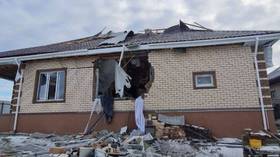Russia opens case against Google over failure to remove banned extremist, X-rated & suicidal content from its search results
Russia’s national telecoms watchdog has launched an administrative case against Google over the American technology giant’s continued reluctance to remove banned content from its search results, as required under Russian law.
The prohibited websites that still can be found in the search results include those with extremist, pornographic and suicidal content, Roskomnadzor said on Monday. The search engine doesn’t delete up to 30 percent of “dangerous content,” the regulator added.
The administrative case has been launched over repeat violations of the 2017 law, which orders search operators to remove content flagged as illegal in a special registry. Google “didn’t present any objections” to the act drawn up against it, Roskomnadzor said.
Also on rt.com Payback time? Moscow considers law which could block US social media giants Facebook & Twitter for censoring Russian news sourcesThe US company may face a fine of up to 5 million rubles (around $65,600) as a result of the proceedings.
Google has already been fined, last year, for refusing to cooperate with Russia’s register of banned websites, and for insufficient filtering of illegal content.
The California-based firm has been deleting websites that are considered illegal in Russia on a regular basis, company sources told Russian media last year. But it wasn’t done automatically, with the reasons for blacklisting each link examined separately.
Back in October, Russia changed its mind about giving Facebook and Twitter extra time to fulfill the legal requirement of moving their servers. The law states that data on Russian users is required to be stored inside the country’s borders.
Think your friends would be interested? Share this story!













